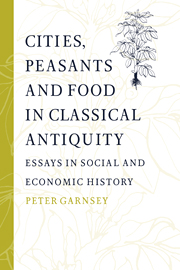Book contents
- Frontmatter
- Contents
- Preface
- Editor's preface
- Acknowledgements
- List of abbreviations
- PART I CITIES
- PART II PEASANTS
- 6 Peasants in ancient Roman society
- 7 Where did Italian peasants live?
- 8 Non-slave labour in the Roman world
- 9 Prolegomenon to a study of the land in the later Roman empire
- 10 Mountain economies in southern Europe
- PART III FOOD
- Bibliography
- Index
9 - Prolegomenon to a study of the land in the later Roman empire
Published online by Cambridge University Press: 02 December 2009
- Frontmatter
- Contents
- Preface
- Editor's preface
- Acknowledgements
- List of abbreviations
- PART I CITIES
- PART II PEASANTS
- 6 Peasants in ancient Roman society
- 7 Where did Italian peasants live?
- 8 Non-slave labour in the Roman world
- 9 Prolegomenon to a study of the land in the later Roman empire
- 10 Mountain economies in southern Europe
- PART III FOOD
- Bibliography
- Index
Summary
INTRODUCTION
This paper focuses on broad structural developments affecting the agricultural economy of the Roman world in late antiquity, with special reference to levels of production and productivity. My general aim is to encourage or provoke economic historians of antiquity into taking a greater interest in the subject than they have done in recent years. In particular, I would welcome the considered thoughts of our honorand on the subject. Harry Pleket has recently published full and illuminating studies of the land in the early Empire, but he has not, as far as I am aware, applied the full armoury of his intellectual skills to the study of late antique agriculture.
I favour a broad approach because I think this is the best way of setting up a dialogue with historians of other periods, and, in particular those historians with a comparative bent. Ancient historians should be making a contribution to comparative historical scholarship.
I would like to make it more difficult for comparative historians to pass over Roman history altogether, or, insofar as they recognize the existence of Roman history, to leap from the Principate to the early Middle Ages, passing over, in the process, a whole period of history, one which happens to be quite as long as the period of the Principate. I want at the same time to challenge the tendency of comparativists to adopt without much question the traditional view of late antiquity as a period of decline.
- Type
- Chapter
- Information
- Cities, Peasants and Food in Classical AntiquityEssays in Social and Economic History, pp. 151 - 165Publisher: Cambridge University PressPrint publication year: 1998



